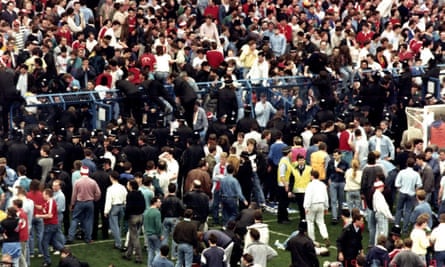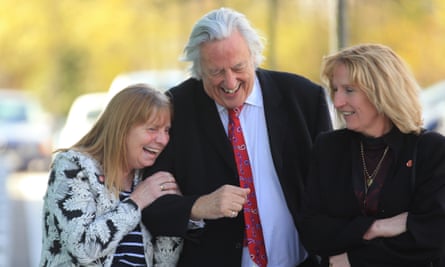A 27-year struggle for truth by the families of the 96 people killed at the Hillsborough football stadium has been vindicated after new inquests into the disaster determined that they had been unlawfully killed.
The jury was directed by the coroner, Sir John Goldring, that their verdict meant that the Liverpool supporters died because of failings of the police officer in command at the FA Cup semi-final on 15 April 1989, South Yorkshire Ch Supt David Duckenfield.
Tuesday’s ruling swept aside claims that fans were drunk, stole from the bodies, and urinated on officers. It also laid bare the actions of the police that day such as taking blood samples, including some from children, to suggest that fans had been drinking, and the concocting of notes afterwards to support their narrative that it was the behaviour of the fans that led to the tragedy.
On Wednesday, the names and ages of each of the victims will be read outside St George’s Hall in Liverpool city centre, where a solemn memorial emblazoned with the words “truth” and “justice” towers over a row of lanterns, one for each of the lives lost in the 1989 tragedy.
In a verdict on Tuesday that represents one of the most damning indictments of a British police force, the jury answered 14 questions about what happened at the football ground, concluding comprehensively that it was actions of South Yorkshire police officers that were the principal cause of the disaster.
The Crown Prosecution Service said it was cooperating with two investigations into possible criminal offences committed by police officers and others leading to the deaths at Hillsborough, and the alleged police cover-up afterwards. That could lead to a prosecution of Duckenfield, who was appointed only 19 days before the game, replacing an experienced match commander, Ch Supt Brian Mole.

Family members who had campaigned for years against South Yorkshire police’s version of events cheered and cried as the jury forewoman delivered the crucial verdict in the courtroom in Birchwood Park, Warrington, that supporters had been unlawfully killed, by a majority of 7-2.
The next question asked the jury whether supporters’ misbehaviour did or may have contributed to the dangerous situation outside the football ground. There were further cheers and tears as the forewoman replied that the jury, of six women and three men, had unanimously concluded that was not the case.
As well as the failings of the South Yorkshire police, the jury criticised the South Yorkshire ambulance service, Sheffield Wednesday football club and its engineers, Eastwood and Partners. They concluded that there were safety deficiencies on the part of Hillsborough itself, Sheffield city council and other authorities whose duty it was to license the ground for safety, and that the 96 died by gross negligence manslaughter.
After the verdicts were read out there was further applause, and somebody in the family rows of public seats called out: “God bless the jury.” Outside, during a break in proceedings, the relatives gathered and spontaneously sang Liverpool football club’s anthem, You’ll Never Walk Alone.
At the 1989 match, Duckenfield ordered the opening of a large gate to allow 2,000 supporters trapped in a crush outside the Leppings Lane turnstiles into the ground. The jury found that he should have ordered the closure of the tunnel that led to central “pens” three and four, but he did not. The incoming supporters went into those pens, where severe overcrowding caused the crush that killed 96 people and caused more than 400 others to be taken to hospital.
Those who died ranged in age from 10 to 67; 37 were teenagers. Three pairs of brothers, one pair of sisters and one father and son, Thomas Howard Sr and Jr, died together. Twenty-six of those who died were parents; 58 children lost a parent. Many of them have, as adults, attended the inquests almost every day during its two-year duration. It is by far the longest case heard by a jury in British legal history.
Barristers for police officers, including those representing Duckenfield, had at these inquests nevertheless repeatedly emphasised allegations that supporters were drunken and misbehaving, which the families and their lawyers denounced as “perpetuating the cover-up”.
Solicitors Marcia Stewart and Elkan Abrahamson, from the law firms representing the Hillsborough Family Support Group (HFSG) and families in the Hillsborough Justice Campaign, said in a statement read outside the court that the verdicts “completely vindicate the families’ long fight for justice”.

They added: “It is therefore all the more shameful that, rather than focusing on the search for truth and despite having made public apologies [in 2012], the approach to the inquests taken by South Yorkshire police and the Yorkshire ambulance service was to fight tooth and nail to avoid adverse findings by the jury. This turned the inquests into an adversarial battle that probably doubled the length of time it might otherwise have [taken].”
Some families and the shadow home secretary, Andy Burnham, called for the South Yorkshire police chief constable, David Crompton, to resign immediately. The officer, who apologised unreservedly on behalf of the force following the verdicts, is stepping down in November.
In its verdicts, the jury concluded:
- Police planning errors “caused or contributed to” the dangerous situation that developed on the day of the disaster.
- Senior police officers failed to manage the build-up of the crowd at the Leppings Lane end of the stadium.
- Duckenfield should have closed a tunnel leading to the central pens when he ordered the exit gate opened, and breached his duty of care to the supporters so grossly as to amount to unlawful killing.
- Police and the ambulance service failed in their response to the crush by failing to recognise its seriousness and declaring a major incident.
- The people who went to the match as spectators to support Liverpool football club were not to blame for the dangerous situation that developed.
- There were safety deficiencies in the design, layout and licensing of Sheffield Wednesday’s Hillsborough stadium.
Margaret Aspinall, chair of the HFSG, whose 18-year-old son James died in the disaster, said she had refused in 1991 to pick up her son’s death certificate, because it had on it the original inquest’s verdict of accidental death.

Aspinall said the police case had been “a disgrace” from the beginning, and called for accountability next from those whose failures led to the deaths. Trevor Hicks, who with his then wife, Jenni, lost both their daughters, Sarah, 19, and Vicki, 15, at Hillsborough, said he was looking to the CPS to take action.
Aspinall paid tribute to Liverpool supporters and survivors of the disaster, many of whom gave harrowing evidence, almost all saying they saw no evidence of drunken or unusually rowdy behaviour outside the ground.
“The fans should go home and be proud of themselves – they are the heroes,” Aspinall said. “They did nothing wrong that day, and we did this for all of them, too. Our city always gets brought down, but yet again it’s the tough people of Liverpool who have had to fight a cause that was so unjust and so unfair.”
MPs will debate the inquest verdict in the Commons on Wednesday. David Cameron, in a tweet, paid tribute to the family campaigners.
Recalling the court in the afternoon, the coroner praised the jury members, who had devoted over two years of life to hearing deeply upsetting and at times horrific evidence. “Your commitment and diligence has been remarkable,” Goldring said. “It is very important that decisions in matters such as the Hillsborough disaster are taken not by lawyers, but by members of the public, such as you. I thank you very much indeed.”
In a statement, Sheffield Wednesday said it “recognised the tireless dedication of the families” and pointed to the great improvements in football stadium safety since 1989.
Jon Stoddart, who heads Operation Resolve, examining whether criminal offences were committed that caused the deaths, has confirmed that Sheffield Wednesday are subject to the investigation.